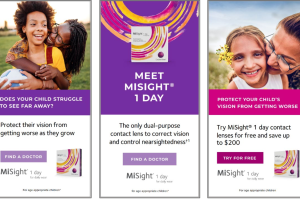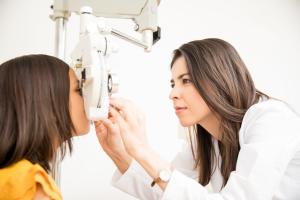CooperVision’s collaborative effort with three U.S. optometry schools will provide long-term myopia management for underserved children.
CooperVision has unveiled a groundbreaking initiative that will bridge myopia management access disparities among under-resourced children in the U. S. The global eye care leader is partnering with three of the nation’s top optometry schools to offer extended myopia treatment for a pilot group beginning in 2024. The program kicked off with inaugural activities in Boston and Chicago.
“All children deserve accessible, quality eye care to protect their future eye health. We are leading the conversation to identify long-term solutions to overcome access inequity for kids with myopia,” said Michele Andrews, OD, Vice President, Professional & Government Affairs, Americas, CooperVision. “Hand-in-hand with several academic partners who share our vision, this initiative represents a major advancement in addressing the childhood myopia epidemic.”
CooperVision will initially partner with optometry school faculty, residents, and students to identify and treat children in need, as well as engage other multidisciplinary community partners. The program structure is designed for scalability, potentially allowing more schools to participate over time.
In metropolitan Boston and central Massachusetts, the New England College of Optometry (NECO) and the Massachusetts College of Pharmacy and Health Sciences (MCPHS) will elevate myopia management within their affiliated community health clinics. “This program will provide vital access to myopia management for children across the region who would otherwise be left out due to access and cost. This gift will ensure improved vision for learning and health outcomes in the years ahead,” said Howard Purcell, OD, President of NECO. “Forward-thinking, collaborative initiatives like this are critical to fight back against myopia’s pervasiveness, starting in our own neighborhoods,” said Greg Waldorf, OD, MPH, Associate Dean of Clinical Programs at MCPHS.
The Illinois College of Optometry (ICO), through its Illinois Eye Institute, will use the program to expand upon its rich history of care with Chicago Public Schools. “If we can collectively determine how to make myopia management accessible to more children, so many lives will be made better for decades—a heroic undertaking with immeasurable impact,” said Mark Colip, OD, President of ICO.
In its initial phase, the program is offering MiSight® 1 day soft contact lenses and Paragon CRT® orthokeratology† contact lenses at no cost for as long as participating children require myopia management. MiSight® 1 day is the first and only soft contact lens approved by the FDA* to both correct vision and slow the progression of myopia in children aged 8-12 at the initiation of treatment.‡1
Ongoing assessments will be conducted throughout the year to monitor the initiative’s performance and to support its continual improvement, facilitating the expansion of engagement aimed at long-term access solutions. CooperVision also plans to work with researchers from each school to aggregate and analyze relevant data supporting the program goals.
"Beyond the direct benefit to children and families who participate, this initiative presents optometry students—the next generation of clinicians who will be at the leading edge of addressing the myopia epidemic—the chance to provide essential care within their communities. For more than a decade, CooperVision has shared that effectively combatting myopia will be a long-term effort involving a wide range of contributors. Today, we are taking one more step in that direction,” said Dr. Andrews.
Forward-Looking Statements
This press release contains "forward-looking statements" as defined by the Private Securities Litigation Reform Act of 1995. Statements relating to plans, prospects, goals, strategies, future actions, events or performance and other statements of which are other than statements of historical fact, including statements regarding the expected scope and benefits of this program. Forward-looking statements necessarily depend on assumptions, data or methods that may be incorrect or imprecise and are subject to risks and uncertainties. Among the factors that could cause actual results and future actions to differ materially from those described in forward-looking statements are: difficulties in executing the program, slow adoption of the program, uncertainties in contractual relationships and pending transactions; changes in legal and regulatory requirements; and other factors described in our Securities and Exchange Commission filings, including the “Business”, “Risk Factors” and "Management's Discussion and Analysis of Financial Condition and Results of Operations" sections in the Company’s Annual Report on Form 10-K for the fiscal year ended October 31, 2023, as such disclosures may be updated in annual and quarterly filings. We caution investors that forward-looking statements reflect our analysis only on their stated date. We disclaim any intent to update them except as required by law.
* U.S. Indications for Use: MiSight® 1 day (omafilcon A) soft (hydrophilic) contact lenses for daily wear are indicated for the correction of myopic ametropia and for slowing the progression of myopia in children with non-diseased eyes, who at the initiation of treatment are 8-12 years of age and have a refraction of -0.75 to -4.00 diopters (spherical equivalent) with ≤ 0.75 diopters of astigmatism. The lens is to be discarded after each removal.
† U.S. Indications for Use: Rigid Gas Permeable Paragon CRT® Contact Lenses (paflufocon B), Paragon CRT® 100 Contact Lenses (paflufocon D) and Paragon CRT Dual Axis® Contact Lenses (paflufocon D) for Corneal Refractive Therapy are indicated for use in the reduction of myopic refractive error in non-diseased eyes. The lenses are indicated for overnight wear in a Corneal Refractive Therapy fitting program for the temporary reduction of myopia up to 6.00 diopters in eyes with astigmatism up to 1.75 diopters. The lenses may be disinfected using only a chemical disinfection system.
Note: To maintain the Corneal Refractive Therapy effect of myopia reduction, overnight lens wear must be continued on a prescribed schedule. Failure to do so can affect daily activities (e.g., night driving), visual fluctuations and changes in intended correction.
‡ Compared to a single vision 1-day lens over a 3-year period.








